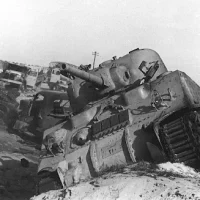On Jan. 30, 1968, Vietnamese communists attacked the American embassy in Saigon. For several hours they held the embassy grounds, inflicting injury and damage and trapping a small group of U.S. military and diplomatic personnel within the embassy. The assailants failed ever to enter the building, and all of them ultimately were killed or captured.… Read More "“Viet Cong Invade American Embassy” — The 1968 Tet Offensive"
Gamal Abdel Nasser was one of the most influential modern-day leaders in the Middle East. As part of the Free Officers Movement, he helped overthrow King Farouk I in 1952 [read about the U.S. embassy’s response to the 1952 Cairo riots] and began modernizing Egypt. He took a hard-line approach towards Western domination of Egypt… Read More "The Suez Crisis — And A Different Side of Nasser"
After D-Day — Life in Paris After Liberation
The Allied invasion of France under the Supreme Command of General Dwight Eisenhower began on D-Day, June 6th ,1944. As the Allies advanced through France, they had to administer liberated areas and plan for the post-war political future. Douglas MacArthur II had been stationed in the Paris embassy prior to the war. Because of his… Read More "After D-Day — Life in Paris After Liberation"
Hungary Escapes the Shadow of the Soviet Union
For those trapped in Eastern Europe in the 20th century, the horrors of World War II were supplanted by the rigors of oppression that was life behind the Iron Curtain. Lawrence Cohen, who was in Budapest from 1991-94, discusses the plight of Jews and Hungarians’ reaction — especially when it came to statuary — when… Read More "Hungary Escapes the Shadow of the Soviet Union"
“Mr. Gorbachev, Tear down this wall!”
On June 12, 1987, President Ronald Reagan made one of his most famous Cold War speeches at the Berlin Wall. James Alan Williams recalls that day, as well as the Gipper’s famous sense of humor at the lesser known party for the city of Berlin. Williams was interviewed by Ray Ewing beginning in October 2003. Read More "“Mr. Gorbachev, Tear down this wall!”"
A Completely Lawless Place – Beirut and the Assassination of Ambassador Meloy and Robert Waring
The Lebanese Civil War was a 15-year conflict that took the lives of more than 130,000 people. Throughout the early 1970s, divisions between Christian Maronites and Palestinians began to deepen and soon escalated into all-out war. While the war was largely a struggle between these two groups, the violence soon affected the U.S. On June… Read More "A Completely Lawless Place – Beirut and the Assassination of Ambassador Meloy and Robert Waring"
The East Berlin Uprising, June 16-17, 1953
It began as a strike by East Berlin construction workers but quickly escalated into waves of protests throughout the German Democratic Republic. The 1953 uprising in East Germany is not as well remembered today as the Hungarian Revolution of 1956 or the Prague Spring of 1968, but it was no less consequential. On the 16th… Read More "The East Berlin Uprising, June 16-17, 1953"
Israel’s Attack on the USS Liberty
On June 8, 1967, a Navy intelligence ship, the USS Liberty, was mistaken for an Egyptian warship and attacked by the Israeli military during the Six-Day War. The strafing and torpedo attack left 34 Americans dead and 171 wounded. The Liberty still managed to reach another U.S. vessel despite suffering heavy damage (including a 40-foot… Read More "Israel’s Attack on the USS Liberty"
The Tiananmen Square Massacre — June 4, 1989
The 1989 massacre at Tiananmen Square was one of the most heart-wrenching displays of state suppression of peaceful assembly in recent history. Following the death of pro-reform Communist leader Hu Yaobang in April 1989, thousands of Chinese students gathered in Beijing’s Tiananmen Square to march in his memory. Within days the gathering had transformed into… Read More "The Tiananmen Square Massacre — June 4, 1989"
The Day Venezuelans Attacked Nixon
In the spring of 1958, President Eisenhower sent Vice President Nixon on a tour of Latin America to improve relations. Unfortunately, the tour would create even more friction, as it was punctuated by protests in various countries, including Ecuador and Peru. His May 13 visit to Venezuela turned violent and threatened the safety of the… Read More "The Day Venezuelans Attacked Nixon"

